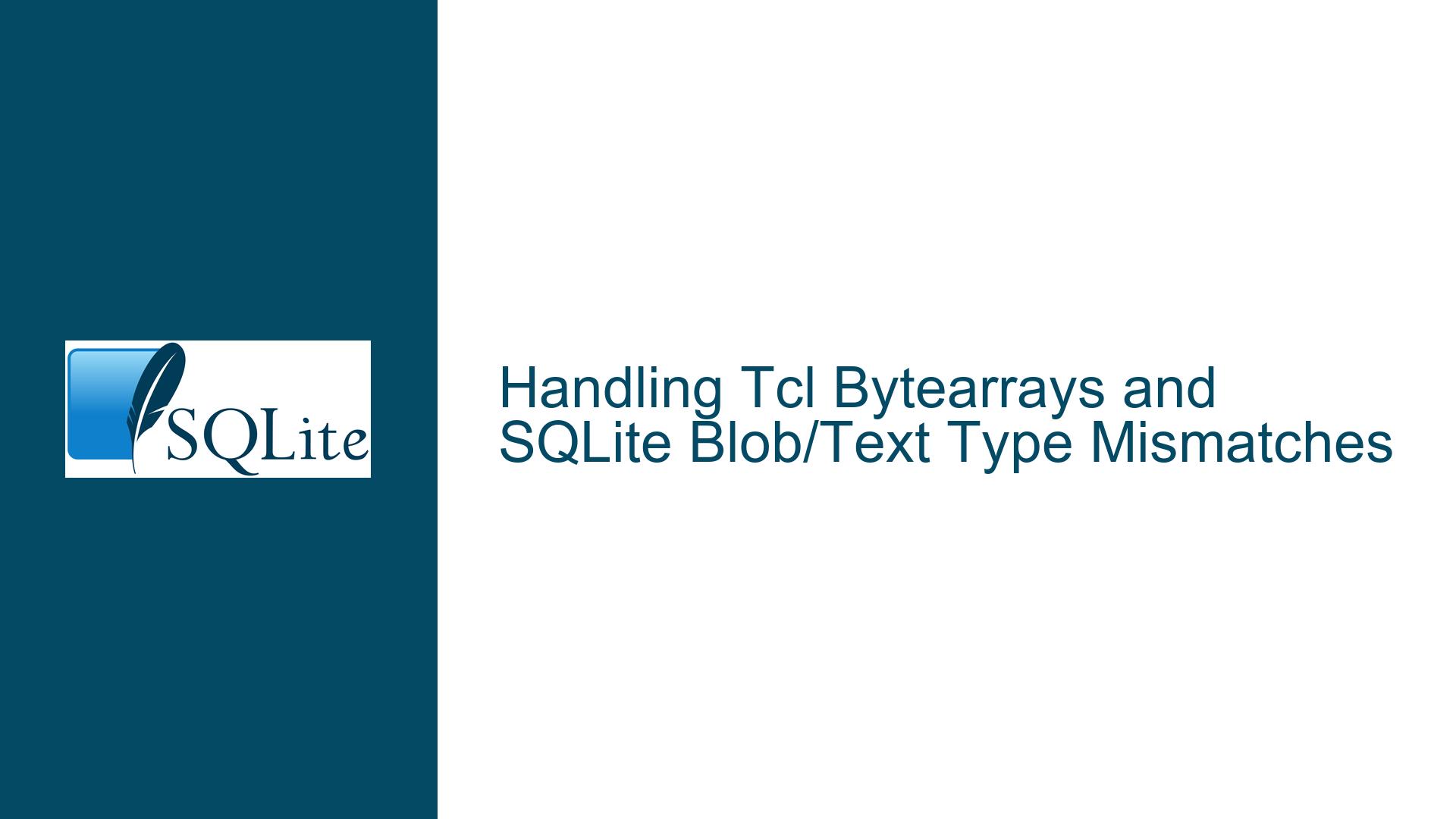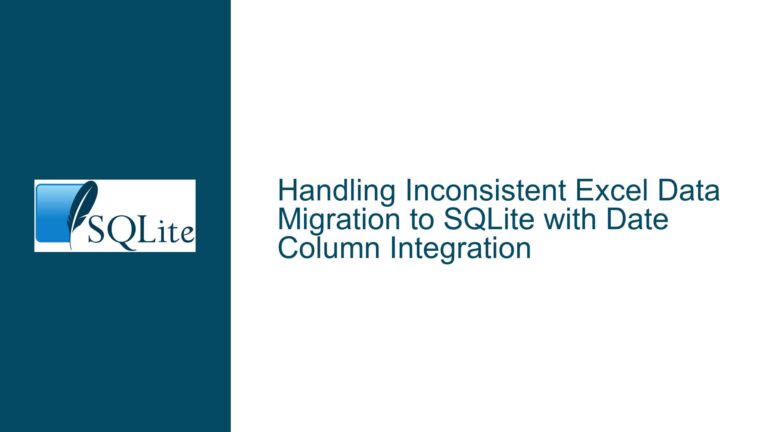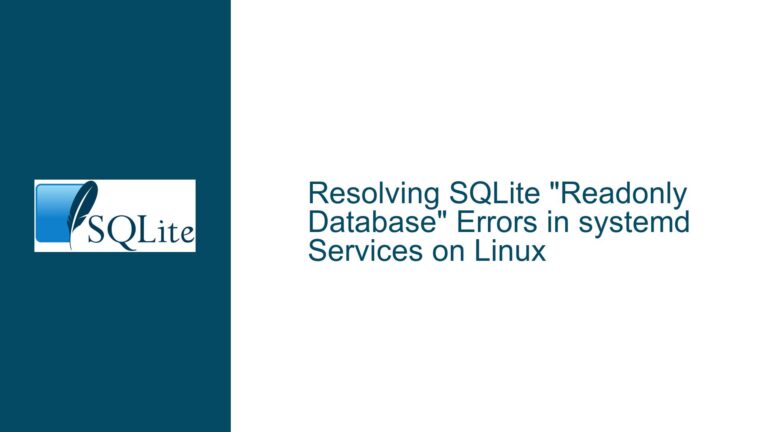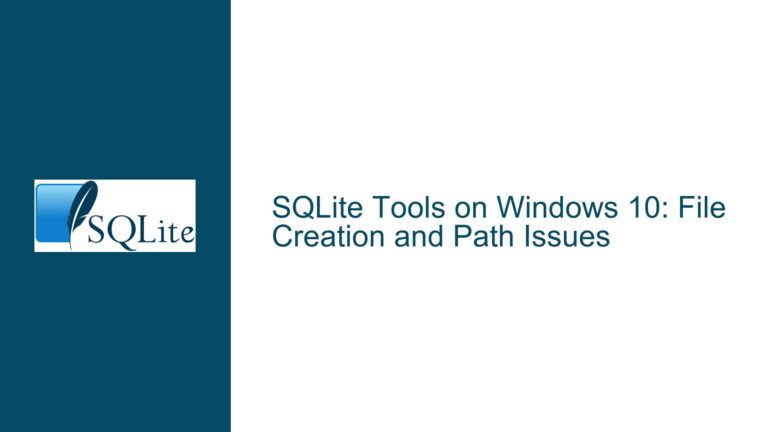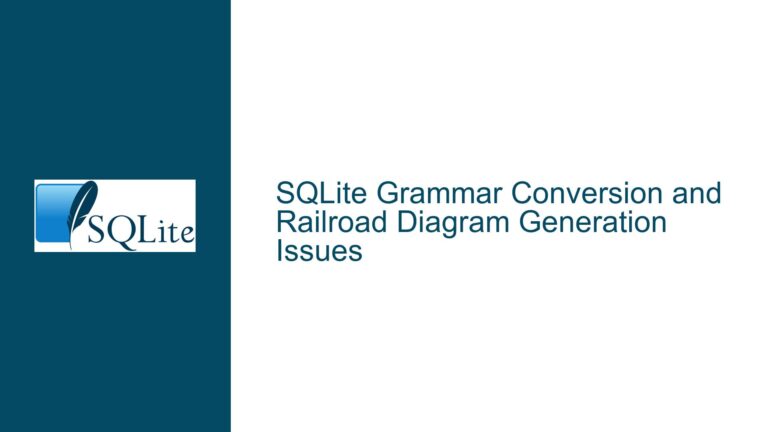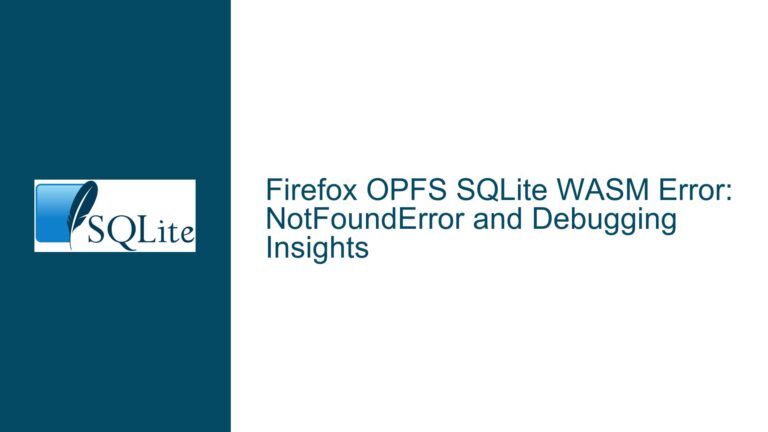Handling Tcl Bytearrays and SQLite Blob/Text Type Mismatches
Tcl Bytearray Representation and SQLite Data Type Conflicts
Issue Overview: Tcl Bytearray String Conversion Disrupts SQLite Blob Comparisons
The core issue arises from the interaction between Tcl’s internal handling of binary data (bytearrays) and SQLite’s type system. When a Tcl bytearray variable gains a string representation, SQLite’s comparison logic treats it as text instead of a blob, even if the bytearray’s binary content matches a blob stored in the database. This occurs because SQLite distinguishes strictly between BLOB and TEXT types during comparisons, and the Tcl interface’s variable binding logic changes behavior based on whether the Tcl_Obj (Tcl’s internal value container) has a string representation cached.
In the provided example:
- A bytearray
[binary format H* 80](binary value0x80) is inserted into a SQLite table. SQLite stores this as aBLOB. - When queried using the original bytearray variable (without string representation), SQLite correctly identifies the match (
typeof(value)returnsblob). - After forcing a string representation via
encoding convertto utf-8 $bytearray, the same variable is treated asTEXTduring subsequent queries. SQLite now attempts to compare the storedBLOBwith the inputTEXT, which fails becauseBLOBandTEXTare distinct types. The comparison returns no match ({}), even though the underlying bytes are identical.
This discrepancy introduces critical challenges for Tcl packages managing binary data in SQLite:
- Data Integrity Risks: Binary data may be stored as
BLOBorTEXTdepending on the internal state of Tcl variables, leading to inconsistent query results. - Developer Burden: Packages must enforce strict rules to prevent unintended string conversions or implement type-checking logic, complicating APIs.
- Undetectable Errors: Mismatches depend on Tcl_Obj’s internal state, which is opaque at the script level. A developer might inadvertently trigger string conversions through routine operations (e.g., logging, concatenation), corrupting queries without obvious errors.
The root of the problem lies in SQLite’s type affinity system and the Tcl interface’s variable binding rules:
- SQLite uses storage classes (
INTEGER,REAL,TEXT,BLOB,NULL) with strict type comparisons.BLOBvalues only match otherBLOBvalues. - The Tcl SQLite interface binds variables as
BLOBonly if the Tcl_Obj has no string representation. If a string representation exists, the variable is bound asTEXT, encoded using the database’s encoding (typically UTF-8).
Possible Causes: SQLite Type Strictness and Tcl_Obj Dual Representation
1. SQLite’s Type Affinity and Comparison Rules
SQLite enforces strict type matching in comparisons. For example:
SELECT 1 WHERE CAST('abc' AS BLOB) = 'abc'; -- Returns no rows
Even if two values have identical bytes, one as BLOB and the other as TEXT, they are considered unequal. This behavior is by design and documented, but it conflicts with Tcl’s model where binary data and text are interchangeable within the 0-255 Unicode range.
2. Tcl_Obj’s Dual Internal Representation
A Tcl_Obj can hold both a bytearray and a string representation. The SQLite Tcl interface uses sqlite3_bind_blob if the Tcl_Obj’s bytes pointer is accessible (i.e., no string representation exists). Otherwise, it uses sqlite3_bind_text, converting the string to the database’s encoding. Once a string representation is generated (e.g., via encoding convertto or string operations), the Tcl_Obj loses its "pure bytearray" status, altering how SQLite binds the variable.
3. Database Encoding and Implicit Conversions
When a BLOB is compared to TEXT, SQLite treats the BLOB as a text value in the database’s encoding. For example, a BLOB containing 0x80 could be interpreted as the UTF-8 character U+0080 (a control character), but if the database uses a different encoding (e.g., ISO-8859-1), the interpretation changes. This implicit conversion is rarely intentional and often leads to incorrect comparisons.
4. API Design Limitations
The Tcl SQLite interface does not provide a mechanism to explicitly specify the desired storage class (BLOB/TEXT) for a variable. The binding is determined implicitly by the Tcl_Obj’s state, forcing developers to micromanage variable internals—a practice discouraged in Tcl’s "everything is a string" philosophy.
Troubleshooting Steps, Solutions & Fixes: Ensuring Consistent Binary Data Handling
1. Enforce Explicit BLOB Binding in Tcl
To prevent unintended TEXT binding, ensure Tcl_Objs retain their bytearray representation. Use Tcl’s binary command to create or modify variables, avoiding operations that generate string representations.
Example: Safe Bytearray Initialization
set bytearray [binary format H* 80]
# Avoid operations like [string length $bytearray], which generates a string rep
Force BLOB Binding with -blob Option (Tcl 8.6+)
In Tcl 8.6 and later, the sqlite3 package supports explicit binding:
db eval {
INSERT INTO t1 VALUES (:bytearray -blob)
}
2. Normalize Data Storage to a Single Type
Choose to store all binary data as either BLOB or TEXT consistently. For example:
Option A: Always Store as BLOB
- Use
[binary format]to create bytearrays. - Avoid string operations on binary variables.
- Use
CAST($value AS BLOB)in SQL to force BLOB type.
Option B: Always Store as TEXT
- Convert binary data to a text-friendly format (e.g., hex or base64):
set hex_value [binary encode hex $bytearray]
db eval { INSERT INTO t1 VALUES($hex_value) }
- Query using the same encoding:
set hex_value [binary encode hex $bytearray]
db eval { SELECT * FROM t1 WHERE value = $hex_value }
3. Use SQL Functions for Type-Agnostic Comparisons
Create a SQL function to compare values as byte sequences, ignoring type:
Step 1: Register a Tcl Comparison Function
db function bytes_equal -deterministic {apply {{a b} {
# Compare as blobs
binary scan $a H* a_hex
binary scan $b H* b_hex
return [expr {$a_hex eq $b_hex}]
}}}
Step 2: Use in Queries
SELECT * FROM t1 WHERE bytes_equal(value, $bytearray)
4. Schema Design with Type Constraints
Add a column to track data type explicitly:
CREATE TABLE t1 (
value BLOB, -- or TEXT
data_type CHECK (data_type IN ('blob', 'text'))
);
When querying, enforce type matching:
set data_type [expr {[string is binary $bytearray] ? "blob" : "text"}]
db eval {
SELECT value FROM t1
WHERE value = $bytearray AND data_type = $data_type
}
5. Mitigate Encoding Mismatches
Configure the database to use UTF-8 encoding, and ensure all text conversions use the same encoding:
db configure -encoding utf-8
# When converting bytearrays to text:
set text_rep [encoding convertfrom utf-8 $bytearray]
6. Patch SQLite or Use Custom Builds (Advanced)
Modify SQLite’s comparison logic to treat BLOB and TEXT as compatible types. This involves altering the sqlite3_value_type() logic in the SQLite source code. While not recommended for general use, it’s an option for specialized deployments.
Sample Code Change in SQLite’s compare.c:
// In sqlite3MemCompare(), before type comparison:
if( (aFlags & MEM_Blob) && (bFlags & MEM_Str) ){
// Treat BLOB and TEXT as comparable
return memcmp(aBlob, bStr, MIN(aN, bN));
}
7. Educate Developers on Tcl_Obj Internals
Document internal behaviors for package users:
- "Binary data variables must not be used in string contexts."
- "Use
binary scanorbinary formatto manipulate bytearrays." - "Test queries with
typeof(value)to detect type mismatches."
8. Use Wrapper Procedures for Data Access
Abstract database operations to enforce type handling:
proc insert_blob {db table value} {
set pure_byte [binary format H* [binary encode hex $value]]
$db eval "INSERT INTO $table VALUES (\$pure_byte -blob)"
}
proc query_blob {db table value} {
set pure_byte [binary format H* [binary encode hex $value]]
$db eval "SELECT * FROM $table WHERE value = \$pure_byte -blob"
}
By systematically applying these strategies, developers can mitigate SQLite’s strict BLOB/TEXT dichotomy while respecting Tcl’s binary data model. The optimal approach depends on the application’s requirements: explicit BLOB binding is ideal for performance-critical systems, while hex encoding simplifies debugging at the cost of storage overhead.
